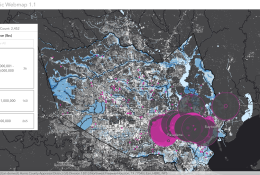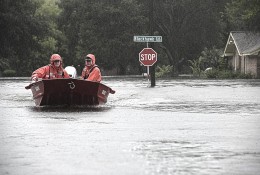The unprecedented 2017 storm dumped more than 50 inches of rain on the Houston area, but as rain events and flooding become the new normal, new research is needed to respond.
Urban Edge
A wider view: Where Houston stands as it recovers from Harvey and builds its resilience
What do trees, bike lanes, and billions in federal disaster aid have in common? They are some of the building blocks of Houston’s future—one that is safer, more equitable and better positioned to withstand future disasters. They’re also among the inventory of measures included in the Kinder Institute’s new Resilience and Recovery Tracker.

Winter Storm Uri showed how Harris County needs a tailored approach to disaster recovery
This week marks the first anniversary of an especially grim event in Texas’ history. Winter Storm Uri touched nearly every corner of the state with power outages that affected millions of people and led to at least 246 lives lost. Unofficial counts put the death toll at three times that number.

A new book, “In Too Deep” tells the story of Bayou Oaks, and its repetitive flooding, from the perspective of 36 mothers who are raising young children there. It follows the families across the course of more than a year, starting right after Hurricane Harvey flooded their homes, and tracking them across the recovery year and beyond as they work to restore their community for the third time in three years.

Mapping project brings Houston’s flood, environmental hazards into clear view
A flood on its own can be disastrous. But floodwaters combined with decades-old toxic waste sites and releases of potentially cancer-causing chemicals—that’s dangerous. Unfortunately, heightened flood risks are unevenly dispersed throughout Harris County.

Floods vs. forever homes: What drove decisions to rebuild rather than relocate after Harvey?
After catastrophic floods—like those after Hurricane Harvey dumped several feet of rain on the Houston area four years ago—survivors generally have two options: rebuild, perhaps with the help of flood insurance or federal reimbursement programs, or relocate, perhaps by selling a damaged home or waiting for a government buyout program. A new study has found that the route people choose might have more to do with their pre-flood plans rather than the scale of the disaster itself. This has implications for how policies are designed to encourage resiliency and managed retreat.

Physical Address
Rice University
Kraft Hall
6100 Main Street, Suite 305
Houston, TX 77005-1892
